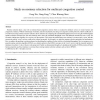Free Online Productivity Tools
i2Speak
i2Symbol
i2OCR
iTex2Img
iWeb2Print
iWeb2Shot
i2Type
iPdf2Split
iPdf2Merge
i2Bopomofo
i2Arabic
i2Style
i2Image
i2PDF
iLatex2Rtf
Sci2ools
102
click to vote
COMCOM
2006
2006
Study on nominee selection for multicast congestion control
Nominee selection plays a key role in nominee-based congestion control, which is essential for multicast services to ensure fairness and congestion avoidance. Without valid design of nominee selection mechanism, the design of congestion control protocols could be inefficient or even flawed. Existing nominee selection schemes choose nominees by comparing the calculated throughput of receivers using the TCP throughput equation with the measured loss rate and round-trip time. Since the calculated throughput varies with different transmission rates, it may not accurately indicate the eligibility of a receiver to be the nominee. This causes the problem that a new nominee is not necessarily `worse' than the current one and the `worst' receiver could not be selected accurately. In this paper, we study the nominee selection principles and mechanisms. First, we address the problem in existing schemes by identifying the conditions for the valid use of calculated throughput. Next, we p...
Related Content
| Added | 11 Dec 2010 |
| Updated | 11 Dec 2010 |
| Type | Journal |
| Year | 2006 |
| Where | COMCOM |
| Authors | Feng Xie, Gang Feng, Chee Kheong Siew |
Comments (0)

